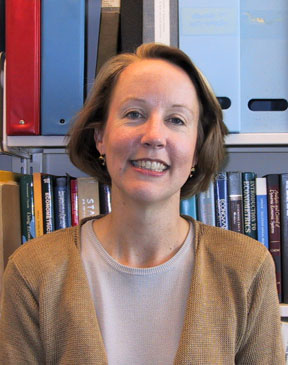|
Web Exclusives: More... November 8, 2000: Ann
Case *83's research isn't limited to stepfamilies
"Half my beat is developing-country work, so I do a lot of work right now in South Africa. It's mostly related to how poor people cope, how they make ends meet. We look at what the government does about poor people - we look at the education system, we look at transfer programs. "South Africa welcomes academics. They make a lot of data publicly available," Case said. "It seems everyone is a stake holder in the new government. The old government had been so closed and secretive, and now they want just the opposite. They really wanted to bring people in and try to encourage people to look at the data." Case's most recent work in South Africa has been with Angus Deaton (professor of economics and international affairs), Christina Paxson (professor of economics and public affairs, on left in the picture above), and Alicia Menendez (lecturer in public and international affairs). "We've been piloting surveys to try to look at the relationship between economic health, physical health, and mental health and social connectedness," Case said. "So we're looking at well-being from a holistic beat. South Africa is a really terrific place to try to go do some of this work, in part because the country is very much in transition socially, politically, and epidemiologically. There are people straddling both sides of the epidemiological divide. "There are people who suffer from infectious diseases of developing countries and the chronic diseases of developed countries. And sometimes those are the same people. I could have had TB and have a heart condition, or I could have diabetes. And I get the double whammy. So it's a really fascinating place to go and look at the country which is changing so rapidly and has all these different populations. It has a first-world population and a third-world population." Case's work sometimes affects policy. "In South Africa, there have been three different projects I've been associated with," Case said. "One is a project on school quality and looking at the effect of school quality on, first, whether children stay in school and, second, whether they finish school and if they take a job and what wages they earn. We can document clearly the effect of school quality. And that's having some effect on the debate there." Case cites another example. "The woman who was charged with setting up the new welfare system for the new government asked me to sit in when they were actually pounding out the new policy. I was an outsider, sitting quietly, and contributed or gave advice when asked. "But most recently they're debating having low-income grants, because the very bottom of the distribution is very, very poor. They asked me to come when the parliamentary portfolio committee was having hearings last March and talk to them about the transfer system they currently have in place. To see if it is working and what the new one would cost, who it would reach, or if there were problems with it," Case said, but she added, "It's very informal. It's never as a consultant, but as an academic who knows something about the numbers." By Lolly O'Brien
|

 Besides
studying the health and economics of stepfamilies, professor Anne
Case *83 (on the right in picture) also studies what goes on in
other countries.
Besides
studying the health and economics of stepfamilies, professor Anne
Case *83 (on the right in picture) also studies what goes on in
other countries.